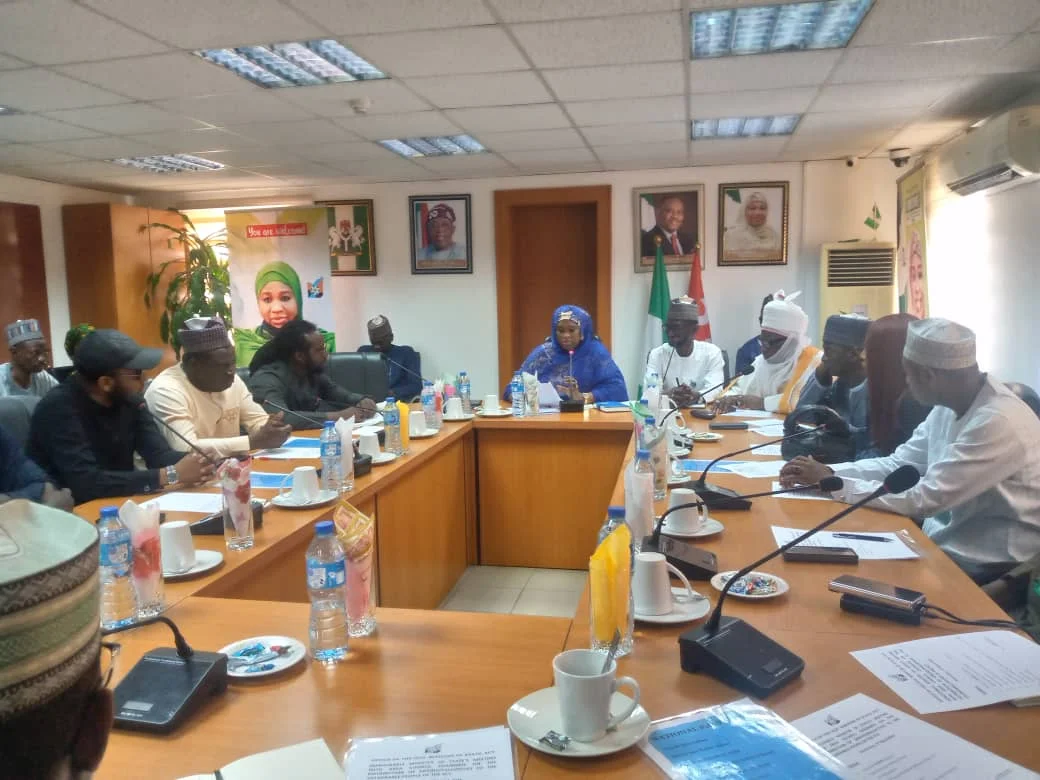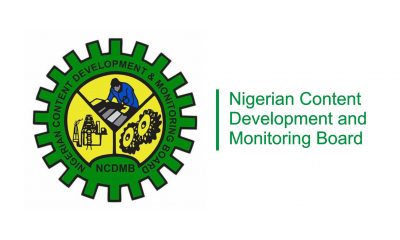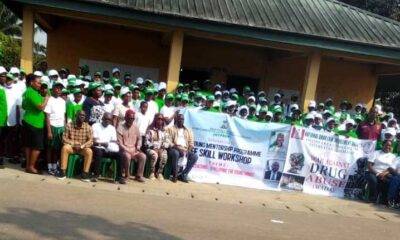Business
There’s Much Pressure On Infrastructures In PH – Town Planner
Most cities across the globe are today confronted by the challenges of over population, rapid expansion induced by urban attractions and other socio-economic activities. This situation is compounded by climate change with its environmental implications.
Port Harcourt, the capital of oil-rich Rivers State, by its vintage position in the West African sub-region, has so much of these problems to contend with. The city is being stretched to a bursting point, necessitating the idea of Greater Port Harcourt initiative of the State government.
The Head, Department of Building Plans Approval and Regulations, Rivers State Ministry of Urban Development and Physical Planning, Port Harcourt, Edmund M. Obinna, said as successive administrations in the state initiate measures to contend with the pressure of expansion induced by the unique city, new challenges continue to mount.
Obinna, a Chattered Town Planner, Environmentalist and member Nigerian Institute of Town Planners said, “the core city, at the time of its inception when Harcourt founded Port Harcourt was at the Wharf, from where you have the railway headquarters (Loco) down to the River.
“That is where you see the core planning that was administered by the then Eastern Nigeria Government as handed over the British colonial people”.
According to him, “that is actually the place where planning took effect and that every other thing after that time was ad-hoc in approach, called disjointed in ‘creamentalism in planning.
He said, because of the fact that Port Harcourt is the choice destination for tourism, economic emancipation where almost everybody who comes in wants to work in, own houses, there is so much pressure on housing, on the work place, traffic and transportation.
“This is a place the Hausas, Yorubas, Ibos come in and are tenants toady, and tomorrow they are landlords, so it is due to pressure on the infrastructure available that make them wear and tear thereby putting pressure on the government”, he said stressing that from the first administration by Diete-Spiff till date, all have put in infrastructures on ground yet the influx of people always increase pressure on the infrastructure.
Obinna who was a pioneer first class graduate of Urban and Regional Planning of the Rivers State University of Science and Technology, said his department which is in charge of giving approval for both residential and industrial houses, filling stations and other needed structures in the old Port Harcourt city and Obio/Akpor, said, “we make our plans just like any other given city, we make provisions for all the needful infrastructure, but because of what I have indentified as the core problem of use on the available amenities, the challenge is always there.
On why some residential areas are gradually turning to industrial sites and vice versa, Obinna attributed that to dynamism in urban growth.
“The city is dynamic. It is not static and that’s why in most climes, especially in the western world, after a given period every city has what I should call a life span. What that life span is achieved, it expands a little, so that you now factor in certain new development”, he explained.
He cited that instance of Greater London which is three times more than the land mess of Rivers State, stressing that there are people who live in Greater London for over two years that have not got to the core city called the London Metropolis, from where we borrowed our own idea of Greater Port Harcourt.
“So people live at the periphery, within the region that is classified as greater and that is the kind of thing we thought of when we now rechristen Greater Port Harcourt. We are thinking of that kind of concept where the core city tended to outgrow its usefulness, because the city is dynamic, trying to burst, we have to look towards the greater areas”, he explained.
At various stages, he said government declared a planning area, acquired a parcel of land, makes plans and introduces certain infrastructural amenities and the city keeps expanding like that. That’s why you have all these GRAs, Rumuibekwe Housing Estate, Elekahia Housing Estates and many others, as steps to check urban growth.
On why some filling stations appear to be close to each others and some residential structures, he explained that the ministry interfaces with the Department of Petroleum Resources (DPR) on such issues, and revealed that there was a period when they had a crucial meeting on the issue and decided that the distance between a filling station and another must be 400 meters when they found that people were just buying land and there was no control on the kind of development they were carrying out.
“That’s why you see on East-West Road and some parts of Aba Road, you see people developing filling stations anyhow before government officials came in to regulate, a lot of damages had been done. We got to a point where we had to even delist and disapprove some filling stations”, he said and pointed out that because of the step, such filling stations are developed but cannot opeate.
On those ones that had been overtaken by the city growth, which found themselves in the core of the city, he said they allowed for introduction of all the safety nets.
He regretted the negative effect of poor attitude of some persons in the society, saying, “planning came in ab initto to address the laicesfar attitude of human beings.
Obinna said, from inception, provisions are made based on zoning principle, on where should be industrial, institutional, commercial, market with network of circulation and roads system, but from time to time whenever there is lacuna in governance, the lazzersfair attitude of man comes to the fore, to do things the way they like, unchecked, the department gets back to field, look at the issue, review it and proffer ways forward.
He said the ways government had employed to address the situation was by introducing urban renewal policy as in the case of the old Port Harcourt which included Port Harcourt City and Obio/Akpor local government areas while also introducing the Greater Port Harcourt Concept which included eight local governments outside Port Harcourt.
On challenges facing that ministry, the Head of Department revealed that, “we grappled with the issue of touting, pressure to help friends and relations, nepotism and all those kind of things just, like any other place. But it came to a time when we had to look inward and reformed”.
According to the HOD, the former government felt that each of the arms has enough to do to address development from its own angle and separated them into Ministry of Urban Development and Physical Planning, Ministry of Housing, Ministry of Land, and Survey, noting that though all were core ministries related in professional practice but called to core jurisdiction.
He further said, that in the Ministry of Urban Development and Physical Planning, “we saw the need when government said no, our revenue is scattered here and there. The touts were abridging the progress of revenue generation. Because of dwindling resources, at a time government was strengthening IGR, how can we key into it as a ministry.
According to him, the then Commissioner, Hon Tammy Danagogo called a strong meeting and at last arrived at a decision to create a department that should be domiciled with everything that had to do with Permit and Revenue Generation, and that was how the new department today was born.
“Before the creation of this department our annual revenue ceiling was not beyond N9 million, but as I speak, at the end of each budget season, we are talking of well over N100 million in so many revenue heads and because of that we are a beautiful bride so to say, and the government does not joke with this ministry,” Obinna said.
He stressed the need for people and residents of the city to change their attitude to urban life particularly in the usage and maintenance of social amenities provided for them by the government to make them last longer and achieve the aim for which they were created.
“Why do people run to London, Dubai, Tokyo, Singapove etc. They are people like us, but there people have comported themselves in line with the way society should grow and they respect government policies”, he said and stressed the need for people to pay their taxes, be disciplined and live upto their responsibility while government on its part plays its role.
On achievements so far recorded, Obinna said inspite challenges, his department has improved on revenue generation, checked touting which was working against the system and ensured that the old Port Harcourt metropolise is now becoming more live able.
Chris Oluoh
Business
NCDMB Tasks Media Practitioners On Effective Reportage

Business
FCTA, Others Chart Path To Organic Agriculture Practices

The Federal Capital Territory Administration (FCTA) and other stakeholders have charted path to improved organic agriculture practices nationwide.
At a 2024 national organic and agroecology business summit held recently in Abuja, stakeholders took turn to speak on the additional areas of promoting the practices.
The Mandate Secretary, FCT Agriculture and Rural Development Secretariat (ARDS), Lawan Geidam, advocated for sustainable practice to develop resilient food systems that will benefit people.
The event, with the theme,”Towards Policies for Upscaling Organic Agroecological Businesses in Nigeria”, is aimed at fostering growth in the organic agriculture sector.
Geidam, who was represented by the Acting Director, Agric Services, in the Secretariat, Mr. Ofili Bennett, emphasised the success of organic and agroecological farming, reling on the active involvement of farmers, businesses and consumers.
He reassured attendees that the FCT Administration, led by the Minister, Nyesom Wike, and Minister of State, Dr. Mariya Mahmoud, remains dedicated to supporting initiatives that enhance the livelihood of residents.
Geidam described the partnership between the Secretariat and the organic and Agroecology initiative for a monthly exhibition and sale of organic products in the FCTA premises as a testament to this commitment.
“The ARDS remains committed to driving policies and initiatives that align with national goals and global standards”, Geidam said.
On her part, the Chairperson of Organic and Agroecology Initiative, Mrs. Janet Igho, urged residents to embrace healthy eating habits to sustain a good lifestyle. She stressed the importance of adopting organic practices, highlighting the benefits of going organic, growing organic and consuming organic products.
Igho expressed her optimism regarding the Agricultural Revival Programmes as articulated in President Bola Ahmed Tinubu’s “Renewed Hope Agenda”, which aims at fostering food and nutrition security.
She also extended her gratitude to ARDS for graciously allocating a space in the FCTA premises for the exhibition and sale of organic products, noting that the platform has been effectively used to advance the promotion of organic agriculture in FCT.
Igho outlined several benefits of organic agriculture which includes improved soil health, increased biodiversity, availability nutritious and healthy food and a reduced carbon footprint.
Stakeholders at the summit, underscored the critical need for enhanced private sector involvement and robust capacity building initiatives for farmers.
They highlighted the importance of implementing supportive policies to foster the growth of the organic agriculture sector.
In the light of the significant challenges facing Nigeria’s agricultural landscape, stakeholders decided that organic agricultural practices present sustainable solutions and a pathway for a more resilient and productive farming systems.
The three-day summit featured exhibitions showcasing organic foods, fruits, vegetables and fertilizers, providing an opportunity for residents to better appreciate the benefits of production and consumption of organic agricultural products.
Business
Dangote Refinery Exports PMS to Cameroon

-
Rivers2 days ago
Expert Advocates IT Driven Security In Rivers
-
News2 days ago
Tinubu To Present 2025 Budget To NASS Dec 17
-
News2 days ago
Fubara Unveils Steps To Boost Agriculture In Etche …As Omehia Flags Off Egwi-Afara-Mba Road Project Says Road’ll Enhance Connectivity, Economic Activities
-

 Business2 days ago
Business2 days agoNCDMB Tasks Media Practitioners On Effective Reportage
-
Sports2 days ago
Rivers Hoopers Target 2025 BAL Final
-

 Nation2 days ago
Nation2 days agoHYPREP Trains Students On Petroleum Jelly, Liquid Soap Making
-
Rivers2 days ago
MNCH Week Ends Today … As Rivers Prepares For Malaria Vaccination In Jan
-
News2 days ago
Fubara Delivers Residential Quarters To NAF

